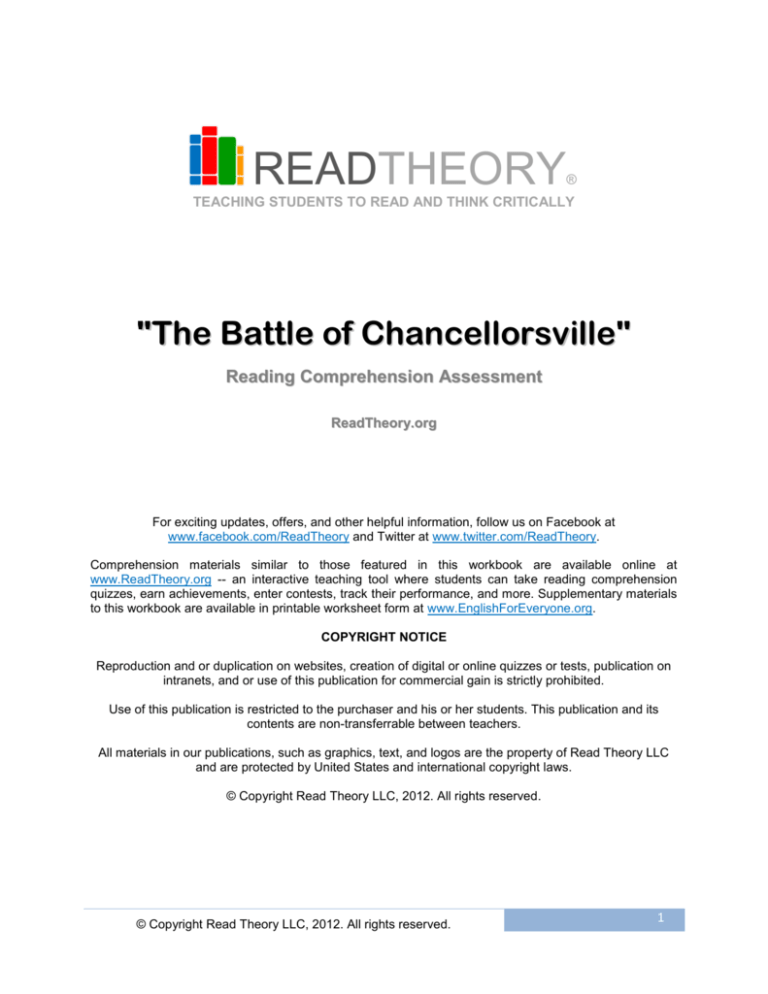
READTHEORY
®
TEACHING STUDENTS TO READ AND THINK CRITICALLY
"The Battle of Chancellorsville"
Reading Comprehension Assessment
ReadTheory.org
For exciting updates, offers, and other helpful information, follow us on Facebook at
www.facebook.com/ReadTheory and Twitter at www.twitter.com/ReadTheory.
Comprehension materials similar to those featured in this workbook are available online at
www.ReadTheory.org -- an interactive teaching tool where students can take reading comprehension
quizzes, earn achievements, enter contests, track their performance, and more. Supplementary materials
to this workbook are available in printable worksheet form at www.EnglishForEveryone.org.
COPYRIGHT NOTICE
Reproduction and or duplication on websites, creation of digital or online quizzes or tests, publication on
intranets, and or use of this publication for commercial gain is strictly prohibited.
Use of this publication is restricted to the purchaser and his or her students. This publication and its
contents are non-transferrable between teachers.
All materials in our publications, such as graphics, text, and logos are the property of Read Theory LLC
and are protected by United States and international copyright laws.
© Copyright Read Theory LLC, 2012. All rights reserved.
© Copyright Read Theory LLC, 2012. All rights reserved.
1
READTHEORY
Passage and Questions
Name________________
Date________________
• Reading Comprehension Assessment
Directions: Read the passage. Then answer the questions below.
The Battle of Chancellorsville
The Battle of Chancellorsville, one of the most famous battles of
the Civil War, took place in Virginia in the spring of 1863. For months,
the two armies had been staked out on opposite banks of a narrow river.
The Confederate troops were led by perhaps the most revered military
tactician in American history, General Robert E. Lee. The Union soldiers
were led by "Fighting" Joe Hooker.
In appearance, personality, and lifestyle, these men were nearly
perfect opposites. Lee, an older man in poor health with a gray beard,
had a somber, measured demeanor. Hooker was a blond, strapping
young man whose vanity over his appearance was but one aspect of his
egotism. Whereas Lee was devout and principled, Hooker was known
for his rollicking enjoyment of both women and whiskey.
Despite the fact that the Confederacy had won the last four major battles and the Union soldiers
were famished, exhausted, and demoralized, Hooker proclaimed, "My plans are perfect. And when I start
to carry them out, may God have mercy on Bobby Lee, for I shall have none." Why, aside from a
propensity for narcissism, was Hooker so confident?
Hooker had used spies, analysts, and even hot air balloons to compile a vast amount of
intelligence about Lee’s army. He had discerned, for example, that Lee had only 61,000 men to Hooker’s
own 134,000. Buoyed by his superior numbers, Hooker covertly moved 70,000 of his men fifteen miles up
and across the river, and then ordered them to sneak back down to position themselves behind Lee’s
army. In effect, Hooker had cut off the Confederate soldiers in front and behind. They were trapped.
Satisfied with his advantage, Hooker became convinced that Lee’s only option was to retreat to
Richmond, thus assuring a Union victory.
Yet Lee, despite his disadvantages of both numbers and position, did not retreat. Instead, he
moved his troops into position to attack. Union soldiers who tried to warn Hooker that Lee was on the
offensive were dismissed as cowards. Having become convinced that Lee had no choice but to retreat,
Hooker began to ignore reality. When Lee’s army attacked the Union soldiers at 5:00 p.m., they were
eating supper, completely unprepared for battle. They abandoned their rifles and fled as Lee’s troops
came shrieking out of the brush, bayonets drawn. Against all odds, Lee won the Battle of Chancellorsville,
and Hooker’s forces withdrew in defeat.
1) Based on information in the passage, it can be concluded that Hooker lost the Battle of
Chancellorsville mostly because of his
A.
B.
C.
D.
E.
vanity
ignorance
overconfidence
faulty information
vices
2) The contrast drawn between Lee and Hooker in paragraph 2 is intended to
A. showcase the different backgrounds and personal histories of these two enemy soldiers
B. provide support for the idea that Lee was a more virtuous person than Hooker, and therefore a
better military commander
C. prove that two men with very different values could end up in similar positions of power
© Copyright Read Theory LLC, 2012. All rights reserved.
2
READTHEORY
Questions
D. suggest that if Hooker had been more devout and principled, he might not have been outwitted by
Lee
E. imply that these men fundamentally differed in their approaches to nearly everything, including
battle
3) In paragraph 3, the author quotes Hooker as saying, “My plans are perfect. And when I start to carry
them out, may God have mercy on Bobby Lee, for I shall have none.” The author most likely includes
this quote in order to
A.
B.
C.
D.
E.
demonstrate Hooker’s belief in his own infallibility
provide an example of the way language has changed since 1863
reveal that Hooker was a deeply religious man in spite of his lifestyle
foreshadow Hooker’s defeat at the hands of Lee’s army
portray Hooker as a merciless general who was compelled by his hated of Lee
4) Based on its use in paragraph 3, it can be inferred that the word propensity belongs to which of the
following word groups?
A.
B.
C.
D.
E.
fondness, partiality, affection
flaw, fault, shortcoming
distaste, aversion, dissatisfaction
tendency, inclination, predisposition
confidence, self-assurance, certitude
5) How many men did Hooker position behind Lee's army?
A.
B.
C.
D.
E.
61,000
70,000
73,000
134,000
158,000
6) As used in paragraph 4, buoyed most nearly means
A.
B.
C.
D.
E.
strengthened
anchored
floated
sharpened
heartened
7) According to the author, Hooker’s advantages going into the Battle of Chancellorsville included
I. numbers
II. position
III. strategy
A.
B.
C.
D.
E.
I only
II only
I and II only
II and III only
I, II, and III
8) As used in paragraph 4, buoyed most nearly means
A. dialogue
B. specific examples
© Copyright Read Theory LLC, 2012. All rights reserved.
3
READTHEORY
Questions
C. vivid details
D. sensory words
E. scenic descriptions
9) If this passage were to continue, which of the following would most likely be the first sentence of the
next paragraph?
A. His army routed, Hooker and his reduced forces hobbled south, back to the center of Confederate
operations where he was harshly rebuked for having squandered his vast army.
B. In all his days of fighting, Hooker had never been met with such surprise and opposition; he took
to solemn contemplation of the events that had transpired as well as the lessons he might learn
from them.
C. Wounded in both body and spirit, Hooker and his severely diminished forces retreated to higher
ground where they proceeded to reload their weapons and prepare for a counter attack.
D. Upon returning to camp, the triumphant Lee immediately ordered for supplies to be brought up
and provisions made for a raucous victory celebration.
E. Not one to gloat over his success, Lee remarked that the victory had been the product of valiant
fighting and good luck, as he began to map out strategies for their next move.
10) Based on the information in the passage, summarize the events of the Battle of Chancellorsville in
your own words.
_____________________________________________________________________________________________________________________________ _______________
____________________________________________________________________________________________________________________________________________
_____________________________________________________________________________________________________________________________ _______________
_____________________________________________________________________________________________________________________________ _______________
_____________________________________________________________________________________________________________________________ _______________
__________________________________________________________________________________________________________________ __________________________
_____________________________________________________________________________________________________________________________ _______________
____________________________________________________________________________________________________________________________________________
_____________________________________________________________________________________________________________________________ _______________
____________________________________________________________________________________________________________________________________________
_____________________________________________________________________________________________________________________________ _______________
____________________________________________________________________________________________________________________________________________
_____________________________________________________________________________________________________________________________ _______________
11) If you had been Hooker, what would you have done differently during the battle of Chancellorsville?
Would you have made the same decisions? Why or why not?
_____________________________________________________________________________________________________________________________ _______________
__________________________________________________________________________________________________________________ __________________________
© Copyright Read Theory LLC, 2012. All rights reserved.
4
READTHEORY
Questions
_____________________________________________________________________________________________________________________________ _______________
_____________________________________________________________________________________________________________________________ _______________
__________________________________________________________________________________________________________________ __________________________
_____________________________________________________________________________________________________________________________ _______________
____________________________________________________________________________________________________________________________________________
_____________________________________________________________________________________________________________________________ _______________
____________________________________________________________________________________________________________________________________________
_____________________________________________________________________________________________________________________________ _______________
____________________________________________________________________________________________________________________________________________
_____________________________________________________________________________________________________________________________ _______________
_______________________________________________________________________________________________________________________________ _____________
12) What do you think happened to Hooker after his defeat at Chancellorsville? Make your inferences
below, explaining why you believe this to likely be the case..
_____________________________________________________________________________________________________________________________ _______________
____________________________________________________________________________________________________________________________________________
____________________________________________________________________________________________________________________________________________
____________________________________________________________________________________________________________________________________________
_____________________________________________________________________________________________________________________________ _______________
_____________________________________________________________________________________________________________________________ _______________
_____________________________________________________________________________________________________________________________ _______________
__________________________________________________________________________________________________________________ __________________________
_____________________________________________________________________________________________________________________________ _______________
____________________________________________________________________________________________________________________________________________
_____________________________________________________________________________________________________________________________ _______________
____________________________________________________________________________________________________________________________________________
_____________________________________________________________________________________________________________________________ _______________
____________________________________________________________________________________________________________________________________________
_____________________________________________________________________________________________________________________________ _______________
_____________________________________________________________________________________________________________________________ _______________
© Copyright Read Theory LLC, 2012. All rights reserved.
5
READTHEORY
Answers and Explanations
1) C
Question Type: Global
Throughout the passage, the author portrays Hooker as very confident. In paragraph 3, the author tells us that even though the
Union army was weakened and demoralized, “Hooker proclaimed, ‘My plans are perfect. And when I start to carry them out, may
God have mercy on Bobby Lee, for I shall have none.’” Then the author asks, “Why, aside from a propensity for narcissism, was
Hooker so confident?” In paragraph 4, the author answers this question by explaining that Hooker’s confidence was based on the
“vast amount of intelligence he had compiled on Lee’s army” as well as on his “superior numbers,” since he had over twice as many
men as Lee did. Furthermore, Hooker had enacted a plan to “cut off the Confederate soldiers in front and behind” by dividing his
troops. Then the author notes, “Satisfied with his advantage, Hooker became convinced that Lee’s only option was to retreat to
Richmond, thus assuring a Union victory.” Based on this information, we can conclude that Hooker became so confident that Lee
would retreat and that the Union would win, he believed he could not lose. In the final paragraph, the author writes, “Union soldiers
who tried to warn Hooker that Lee was on the offensive were dismissed as cowards. Having become convinced that Lee had no
choice but to retreat, Hooker began to ignore reality.” As a result of this, Hooker’s soldiers were caught “completely unprepared for
battle” when Lee’s army attacked, so Hooker lost, despite having more men and an advantageous position. This tells us that Hooker
was too confident. As a result of his belief that he could not lose, Hooker failed to prepare his soldiers for battle, and so they lost.
This means that Hooker lost the Battle of Chancellorsville mostly because of his overconfidence. Therefore (C) is correct. In
paragraph 2, the author writes, “Hooker was a blond, strapping young man whose vanity over his appearance was but one aspect of
his egotism.” But Hooker’s “vanity over his appearance” is not what caused him to fail to prepare his men for battle. This
means (A) is incorrect. In paragraph 4, we learn that “Hooker began to ignore reality.” But this does not mean that he was ignorant
or uninformed. In fact, the author tells us that “Union soldiers…tried to warn Hooker that Lee was on the offensive,” but he chose not
to listen to them. This means that Hooker did not lose the battle because of his ignorance. This eliminates (B). In paragraph 4, we
learn that “Union soldiers who tried to warn Hooker that Lee was on the offensive were dismissed as cowards.” This means that
Hooker did not have faulty information. He had accurate information, but he chose to ignore it. This makes (D) incorrect. In
paragraph 2, the author describes Hooker’s “rollicking enjoyment of both women and whiskey,” and these things could be
considered vices, but these vices are not what caused Hooker to fail to prepare his men for battle. Therefore (E) is incorrect.
2) E
Question Type: Inference
In paragraph 2, the author contrasts Lee and Hooker, claiming, “In appearance, personality, and lifestyle, these men were nearly
perfect opposites.” Whereas the author portrays Lee as “somber,” “measured,” “devout,” and “principled,” the author describes
Hooker as “blond” and “strapping,” full of “vanity” and “egotism,” and “known for his rollicking enjoyment of both women and
whiskey.” Later in the passage, the author describes how the two men differed in their approach to the battle. In the final paragraph,
the author writes that Hooker, supremely confident, became “convinced that Lee had no choice but to retreat” and “began to ignore
reality.” On the other hand, Lee, “despite his disadvantages of both number and position,” attacked Hooker’s troops in such a way
that took advantage of the Union army’s complacency. Most of the passage depicts the different ways that Lee and Hooker
approached the Battle of Chancellorsville. The contrast drawn in paragraph 2 adds background information that shows Lee and
Hooker were also different in many other ways. This tells us that the contrast drawn between Lee and Hooker in paragraph 2 is most
likely intended to imply that these men fundamentally differed in their approaches to nearly everything, including battle. Therefore
(E) is correct. Although the contrast drawn in paragraph 2 highlights the “appearance, personality, and lifestyle” of these two men, it
does not reveal anything about the men’s backgrounds or personal histories. This means (A) is incorrect. While the author suggests
that Lee was more virtuous than Hooker in his private life, he or she does not imply that this virtue made Lee a better military
commander. This means that the contrast drawn in paragraph 2 is not intended to support this idea. This eliminates (B). Although it
does appear from the details of paragraph 2 that Lee and Hooker had very different values, the author is not concerned with how
two men with very different values could end up in similar positions of power. Since this topic is not discussed in the passage, it is
unlikely that the contrast drawn in paragraph 2 is intended to prove this point. This makes (C) incorrect. While the author suggests
that Lee is more “devout and principled” than Hooker, the passage does not provide information to suggest that the author believes
that if Hooker had been more devout and principled he might not have been outwitted by Lee. This means (D) is incorrect.
3) A
Question Type: Inference
In paragraph 3, the author quotes Hooker as saying, “My plans are perfect. And when I start to carry them out, may God have mercy
on Bobby Lee, for I shall have none.” To understand why the author most likely includes this quote, we need to look at the context of
the quote. In the beginning of paragraph 3, the author notes that Hooker says his plans are perfect in spite of the fact that his troops
are “famished, exhausted, and demoralized.” This means that Hooker is confident that his plans will be successful even though his
army is very weak. In the final sentence of paragraph 3, the author asks, “Why, aside from a propensity for narcissism, was Hooker
so confident?” This tells us that the quote is intended to show how confident Hooker was in his belief that he would win. This means
the author most likely includes this quote in order to demonstrate Hooker’s belief in his own infallibility. Therefore (A) is correct. The
author does not discuss how language has changed since 1863. This eliminates (B). Although in this quote Hooker mentions God,
this does not necessarily reveal that Hooker was a deeply religious man. This makes (C) incorrect. While this quote is an ironic
contrast to Hooker’s defeat at the hands of Lee’s army, it does not necessarily foreshadow this defeat. This means (D) is incorrect.
Although Hooker claims that he will have no mercy on Lee, this does not necessarily mean that he is a merciless general who was
compelled by his hatred of Lee. In general, the author portrays Hooker as egotistical, not merciless. This makes (E) incorrect.
4) D
Question Type: Vocabulary
propensity (noun): an inclination or natural tendency to behave in a particular way.
In paragraph 3, the author writes, “Why, aside from a propensity for narcissism, was Hooker so confident?” In order to understand
the meaning of propensity, it is helpful to consider the context of the previous paragraph. In paragraph 2, the author describes
Hooker as a “man whose vanity over his appearance was but one aspect of his egotism,” so we can understand that Hooker had a
tendency to be vain and egotistical. Since vanity, egotism, and narcissism all have a similar meaning, we can understand that
© Copyright Read Theory LLC, 2012. All rights reserved.
6
READTHEORY
Answers and Explanations
Hooker was a man who had a predisposition for narcissism or who was inclined toward narcissism. This tendency to be narcissistic
partly explains why Hooker was so confident, because he had a very high opinion of himself. This means that propensity belongs to
the word group tendency, inclination, predisposition. Therefore (D) is correct. While Hooker may have a tendency toward
narcissism, this does not mean that he had a fondness for it. Since narcissism is a personality trait, it is unlikely that someone would
have a fondness or affection for it, as people do not usually choose their personality traits. It is more likely that a person would have
a predisposition for it. This means propensity does not belong to the word group fondness, partiality, affection. This eliminates (A).
Though some many consider narcissism a flaw or fault, the author does not explicitly judge Hooker for being narcissistic.
Throughout the passage, the author describes Hooker’s personality rather than judges it. Also, some people may consider
narcissism to be a strength, especially in a military commander. This means it is unlikely that the author would write that Hooker had
a flaw of narcissism. The author would be more likely to choose a more neutral word like tendency. This tells us propensity does not
belong to the word group flaw, fault, shortcoming. This makes (B)incorrect. Based on information in paragraph 2, we can conclude
that Hooker had a predisposition for narcissism, not an aversion to it. This means propensity does not belong to the word group
distaste, aversion, dissatisfaction. Therefore (C) is incorrect. The author suggests that “a propensity for narcissism” might be one
reason why Hooker was “so confident,” and it does not make sense to say that a confidence of narcissism might be one reason why
Hooker was “so confident.” This means propensity does not belong to the word group confidence, self-assurance, certitude. This
makes (E) incorrect.
5) B
Question Type: Detail
To answer this detail question correctly, we need to find where the author discusses Hooker’s plans for the battle in the passage. A
good way to do this is to scan the topic sentence of each paragraph, since this sentence will likely tell us what information can be
found in the rest of that paragraph. The topic sentence of paragraph 4 reads: “Hooker had used spies, analysts, and even hot air
balloons to compile a vast amount of intelligence about Lee’s army.” This lets us know that the details we are looking for can likely
be found in paragraph 4. In paragraph 4, the author writes, “Buoyed by his superior numbers, Hooker covertly moved 70,000 of his
men fifteen miles up and across the river, and then ordered them to sneak back down to position themselves behind Lee’s army.”
This means that Hooker positioned 70,000 men behind Lee’s army. Therefore (B) is correct. The passage does not provide
information to support choices (A), (C), (D), and (E). Therefore they are incorrect.
6) E
Question Type: Vocabulary
buoy (verb): to raise the spirits of; hearten; bolster; support.
In paragraph 4, the author writes, “Buoyed by his superior numbers, Hooker covertly moved 70,000 of his men fifteen miles up and
across the river, and then ordered them to sneak back down to position themselves behind Lee’s army.” To understand the meaning
of the word buoyed, it is helpful to look at the context of the previous sentence. In it, the author writes, “He had discerned, for
example, that Lee had only 61,000 men to Hooker’s own 134,000.” This tells us that Hooker was “buoyed by his superior numbers”
because he had learned he had over twice as many men as Lee. Hooker was heartened by the fact that he had so many more men
than Lee, since this information gave him the confidence to move 70,000 of his men into position behind Lee’s army. From this we
can understand that in this context buoyed most nearly means heartened. Therefore (E) is correct. Hooker was not physically
strengthened “by his superior numbers.” Instead, his spirits were raised, because these numbers gave him the confidence to divide
his men. This means (A) is not the best choice. Hooker was not anchored or weighed down “by his superior numbers,” because his
spirits were raised. This makes (B) incorrect. Although in another context buoyed could mean floated, in this case Hooker was not
literally floating. Instead, his spirits were raised, meaning he was heartened. Therefore (C) is incorrect. Hooker was
not sharpened “by his superior numbers,” but rather his spirits were raised. This eliminates (D).
7) C
Question Type: Detail
To answer this detail question correctly, we need to find where the author discusses Hooker’s plans and advantages going into
battle in the passage. A good way to do this is to scan the topic sentence of each paragraph, since this sentence will likely tell us
what information can be found in the rest of that paragraph. The topic sentence of paragraph 4 reads: “Hooker had used spies,
analysts, and even hot air balloons to compile a vast amount of intelligence about Lee’s army.” This lets us know that the details we
are looking for can likely be found in paragraph 4. In paragraph 4, the author writes that Hooker “had discerned…that Lee had only
61,000 men to Hooker’s own 134,000” and that Hooker was “buoyed by his superior numbers.” Since Hooker had over twice as
many men as Lee, this tells us that Hooker’s advantages going into battle included numbers. This supports option (I). In paragraph
4, we learn that “Hooker covertly moved 70,000 of his men fifteen miles up and across the river, and then ordered them to sneak
back down to position themselves behind Lee’s army. In effect, Hooker had cut off the Confederate soldiers in front and behind.
They were trapped.” The author also tells us that once Hooker had moved his men into this position, he was “satisfied with his
advantage.” This means that Hooker’s advantages going into battle included position. This supports option (II). The author does not
mention any advantages Hooker had in terms of strategy in paragraph 4. In paragraph 5, the author writes, “Yet Lee, despite his
disadvantages of both numbers and position, did not retreat. Instead, he moved his troops into position to attack. Union soldiers who
tried to warn Hooker that Lee was on the offensive were dismissed as cowards. Having become convinced that Lee had no choice
but to retreat, Hooker began to ignore reality. When Lee’s army attacked the Union soldiers at 5:00 p.m., they were eating supper,
completely unprepared for battle.” This tells us that Hooker’s strategy left his soldiers “completely unprepared for battle,” whereas
Lee’s strategy was to go “on the offensive.” This means that Hooker’s advantages going into battle did not include strategy. This
eliminates option (III). Therefore (C) is correct.
8) C
Question Type: Global
Throughout the passage, the author uses vivid details to help us envision this historical account. For example, in paragraph 2 he or
she describes Lee as “an older man in poor health with a gray beard” and “a somber, measured demeanor.” On the other hand, the
author describes Hooker as “a blond, strapping young man.” In paragraph 3, the author includes a direct quote from Hooker to
© Copyright Read Theory LLC, 2012. All rights reserved.
7
READTHEORY
Answers and Explanations
illustrate his confidence. In paragraph 4, the author tells us that Hooker had even used “hot air balloons to compile a vast amount of
intelligence about Lee’s army.” In paragraph 5, the author describes the battle with details that help us envision the scene, telling us
that the Union soldiers were “eating supper” and so they “abandoned their rifles” when the Confederate soldiers “came shrieking out
of the brush, bayonets drawn.” All of these vivid details help bring this historical account to life. Therefore (C) is correct. Although the
author includes a quote in paragraph 3, this is not the same thing as dialogue between two or more people. This means (A) is
incorrect. The author does not use any specific examples throughout the passage. Instead, he speaks in general terms about both
leaders and their two armies. This means (B) is incorrect. While the author does use vivid details, most of these appeal to the sense
of sight. The author does not include many details about how things smelled, tasted, felt, or sounded, so these details cannot
necessarily be described as sensory words. This eliminates (D). The author does not use scenic descriptions to describe the
landscape. Instead, he describes the men and the battle. This makes (E) incorrect.
9) E
Question Type: Global
Throughout the passage, the author focuses on the contrast between Hooker’s narcissistic overconfidence and Lee’s pragmatic
determination. In paragraph 2, the author notes that Lee had “a somber, measured demeanor” and was “devout and principled.”
Based on this information, we can infer that Lee was not likely one to celebrate his victory extensively or gloat over his success, but
rather to keep working to prepare for the next battle. The sentence that most accurately reflects this characterization of Lee is “Not
one to gloat over his success, Lee remarked that the victory had been the product of valiant fighting and god luck, as he began to
map out strategies for their next move.” This means that if the passage were to continue, this sentence would most likely be the first
sentence of the next paragraph. Therefore (E) is correct. Hooker was the leader of the Union army, not the Confederate army, so he
would not have hobbled south, back to the center of Confederate operations. Instead, he would have retreated to the north. This
makes (A) incorrect. In paragraph 2, the author describes Hooker as “a blond, strapping young man whose vanity over his
appearance was but one aspect of his egotism” and who was “known for his rollicking enjoyment of both women and whiskey.”
Throughout the passage, Hooker is portrayed as overconfident and narcissistic, even to the point that he “ignore[s] reality.” The
passage does not provide information to support the idea that Hooker was prone to contemplation or learning lessons from his
errors. This means (B) is incorrect. It is possible that Hooker and his forces were wounded in both body and spirit, and that they
retreated to higher ground where they proceeded to prepare for a counter attack. However, this information makes Hooker appear
dutiful, determined, and hardworking. This is not in keeping with the information presented in the passage depicting Hooker as
overconfident, leaving his forces “completely unprepared for battle.” Such an action is more in keeping with the characterization of
Lee in the passage. What is more, the author states that Hooker and his men were "completely unprepared for battle" and that, as a
result, they "abandoned their rifles." This means that they would not be prepared enough to mount a counter attack. This means this
sentence is not likely to be the first sentence of the next paragraph. This eliminates (C). Although Lee was victorious, the description
of him in paragraph 2 as “somber,” “measured,” “devout,” and “principled” does not suggest that he would feel triumphant and enjoy
a raucous victory celebration. Hooker, had he won instead of Lee, might have celebrated in such a manner, but the author suggests
that Lee’s pragmatic determination would lead him to keep working to prepare for the next move. Therefore (D) is incorrect.
© Copyright Read Theory LLC, 2012. All rights reserved.
8

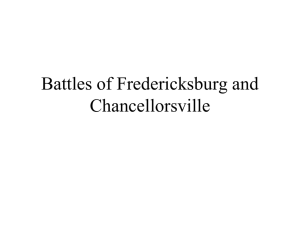
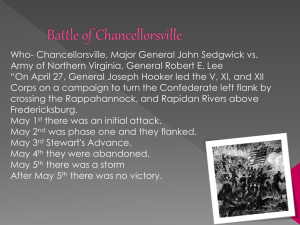
![[[1]] August 27 / [18]90 The Camp. Sunningdale. My dear Mrs Gunn](http://s3.studylib.net/store/data/007422511_1-91a26c2de4546758ee6371752612bc04-300x300.png)
![[[1]] Bot[anic] Garden Cambridge USA Sept 28/[18]77 Dearest](http://s3.studylib.net/store/data/008497646_1-c2a18b2b7e257bd3d257765d6b463d80-300x300.png)
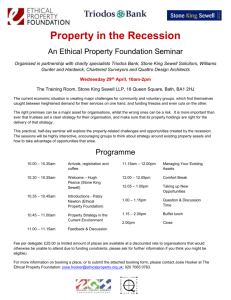
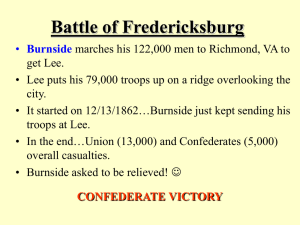
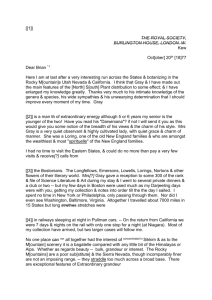
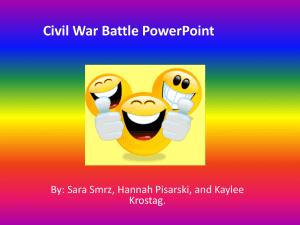
![[[1]] Copy*1 H.M.S. Erebus Berkeley Sound Falkl[a]nd Nov[ember](http://s3.studylib.net/store/data/007561645_2-e073f5cfe18af2a59c8b5c1b789daea4-300x300.png)